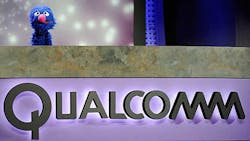Qualcomm to Pay Huge Fine to Settle China Antitrust Case
SAN FRANCISCO – U.S. mobile chip titan Qualcomm will pay nearly a billion dollars to end a long-running antitrust probe in China, the company said, in perhaps the biggest fine ever levied by Beijing in such a case.
Under terms of an agreement with China's National Development and Reform Commission (NDRC), Qualcomm will modify its business practices in the country and pay about $975 million, the California-based chip maker announced.
The agreement will end the commission's investigation into Qualcomm under of China's anti-monopoly law, according to the company.
"We are pleased that the investigation has concluded and believe that our licensing business is now well positioned to fully participate in China's rapidly accelerating adoption of our 3G/4G technology," Qualcomm president Derek Aberle said in a release.
"We are pleased that the investigation has concluded and believe that our licensing business is now well positioned to fully participate in China's rapidly accelerating adoption of our 3G/4G technology." - Derek Aberle, Qualcomm president
The NDRC said the fine was equivalent to 8% of Qualcomm's 2013 sales in China, as it blasted the U.S. company over its actions.
Qualcomm's business practices "excluded and restricted market competition, hampered and restrained technical innovation and development, harmed consumers' interests, and violated the country's anti-monopoly law," it said in a statement.
The NDRC, one of three Chinese government agencies which handle anti-trust cases, said the company charged "exorbitant" licensing fees, bundled sales of patent licenses and attached "unreasonable" conditions to sales of chips.
Qualcomm said that as part of the settlement it modified the terms under which it licenses its mobile chip technology in China.
The NDRC has said the investigation -- which formally started in November 2013 -- was triggered after unnamed industry players complained the firm was abusing its market dominance to charge high prices.
Over the past two years, Chinese authorities have stepped up scrutiny of foreign firms, launching sweeping investigations into alleged malpractice in sectors ranging from pharmaceuticals to baby formula.
In August last year, the NDRC levied a combined 1.24 billion yuan fine on 12 Japanese auto parts firms, which media reports at the time said was the biggest ever in an anti-monopoly case.
Qualcomm shares ended the trading day up slightly on Monday and then rose more than 1% to $68.10 in after-market activity.
Qualcomm chief executive Steve Mollenkopf said the deal "has removed the uncertainty surrounding our business in China, and we will now focus our full attention and resources on supporting our customers and partners in China and pursuing the many opportunities ahead."
Qualcomm, whose chips are used in a large number of mobile phones and devices, agreed to charge royalties of 5% for 3G devices and 3.5% for 4G devices, and will not condition the sale of chips on "unreasonable" terms, according to the agreement.
Copyright Agence France-Presse, 2015
About the Author
Agence France-Presse
Copyright Agence France-Presse, 2002-2025. AFP text, photos, graphics and logos shall not be reproduced, published, broadcast, rewritten for broadcast or publication or redistributed directly or indirectly in any medium. AFP shall not be held liable for any delays, inaccuracies, errors or omissions in any AFP content, or for any actions taken in consequence.
